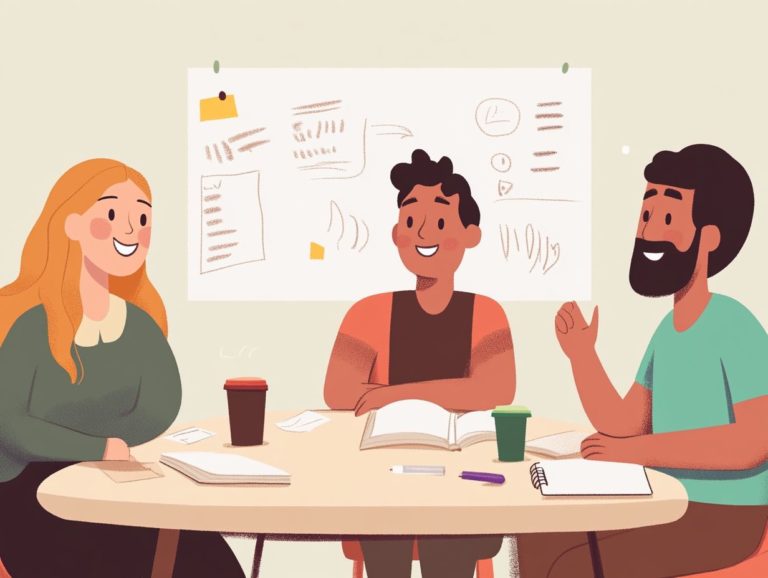5 Inspirational Quotes About Language Learning
Language transcends mere words; it opens doors to understanding diverse cultures, thoughts, and emotions.
This article shares five inspiring quotes about the amazing impact of learning a new language. Each quote reminds us of the personal and social benefits of embracing new languages.
We ll explore practical strategies for learning, address common challenges, and offer tips to keep you motivated on your journey. Join us to discover how learning a new language can enrich your life and expand your horizons.
Contents
- Key Takeaways:
- 1. “Language is the road map of a culture.” – Rita Mae Brown
- 2. “To have another language is to possess a second soul.” – Charlemagne
- 3. “One language sets you in a corridor for life.” – Frank Smith
- 4. “Language is the blood of the soul into which thoughts run and out of which they grow.” – Oliver Wendell Holmes
- 5. “If you talk to a man in a language he understands, that goes to his head. If you talk to him in his own language, that goes to his heart.” – Nelson Mandela
- How Can Learning a New Language Benefit You?
- Frequently Asked Questions
- What do these quotes about language learning teach us?
- How can inspirational quotes motivate us to learn a language?
- What can we learn from the quote “The limits of my language are the limits of my world” by Ludwig Wittgenstein?
- What do these quotes tell us about language learning and personal growth?
- Why is the quote “To have another language is to possess a second soul” by Charlemagne so powerful?
- How can we apply these quotes to our language learning journey?
Key Takeaways:

“Language is more than just words, it is a reflection of a culture and its people’s journey.”
“Learning a new language gives you a deeper understanding of yourself and the world around you.”
“Becoming bilingual opens up countless opportunities and possibilities in life.”
1. “Language is the road map of a culture.” – Rita Mae Brown
This highlights how vital language is to understanding culture. It s not just a communication tool; it reflects histories and aspirations.
Rita Mae Brown said, “Language is the road map of a culture.” Speaking someone s language opens a gateway to their hearts, as noted by Nelson Mandela.
Ludwig Wittgenstein argued that the limits of your language are the limits of your world. Each language embodies unique expressions of wisdom, traditions, and beliefs.
Embracing linguistic diversity enriches your connections across borders and fosters a deeper appreciation for our shared humanity.
2. “To have another language is to possess a second soul.” – Charlemagne
Charlemagne s insightful remark encapsulates the transformative journey that learning a second language offers. It helps you learn different languages and fuels your personal growth.
As you encounter various cultures and perspectives, you immerse yourself in the vibrant world around you. Acquiring a second language helps you build bridges among diverse communities.
Johann Wolfgang von Goethe said, He who knows no foreign languages knows nothing of his own. Exploring new languages and their cultural nuances cultivates resilience and adaptability.
Ultimately, this journey can completely transform how you see yourself within the intricate tapestry of global society.
3. “One language sets you in a corridor for life.” – Frank Smith
Frank Smith eloquently captured the profound impact of language learning when he stated, “One language sets you in a corridor for life. Two languages open every door along the way.” This insight shows how mastering multiple languages can unlock a world of opportunities.
In today s interconnected world, being fluent in several languages significantly boosts your career prospects. Employers seek candidates who can bridge cultural divides and nurture relationships.
As you embark on this journey, you may face hurdles like complex grammar rules. However, perseverance through these challenges can lead to substantial rewards.
Ultimately, overcoming obstacles not only advances your career but also enriches your personal experiences, transforming how you engage with the world.
4. “Language is the blood of the soul into which thoughts run and out of which they grow.” – Oliver Wendell Holmes

Oliver Wendell Holmes once said, “Language is the blood of the soul into which thoughts run and out of which they grow.” This captures the idea that language is vital for expressing our deepest thoughts and emotions.
This strong connection between language and life highlights why mastering a language can lead to wisdom and enlightenment.
When you immerse yourself in a new language, you’re not just learning vocabulary and grammar; you’re unlocking fresh perspectives on the world around you.
Edward Sapir emphasized this idea, stating, “Language does not merely reflect experience; it actively shapes it.” Mastering another language can change how you perceive your environment.
Gaston Bachelard echoed this idea, saying, “Words are the light of the mind,” highlighting how effective expression can illuminate our thoughts.
Through language, you access diverse cultures, build meaningful relationships, and transform your identity in ways that might otherwise remain unexplored.
5. “If you talk to a man in a language he understands, that goes to his head. If you talk to him in his own language, that goes to his heart.” – Nelson Mandela
Nelson Mandela once said, If you talk to a man in a language he understands, that goes to his head. If you talk to him in his own language, that goes to his heart. This emphasizes the deep emotional connection that comes from speaking someone s native tongue.
When you communicate in a person’s language, you re not just sharing words; you re building a bridge of empathy and connection.
Overcoming language barriers allows you to share experiences and emotions more freely, creating bonds that go beyond mere words.
In cultures like Japan, the nuances of honorifics convey respect and intimacy. In Latin American countries, storytelling is a deeply personal practice that strengthens communal ties.
Navigating these language details involves heartfelt dialogue that honors cultural identity and personal history. This deeper understanding can dismantle prejudices and create lasting connections.
How Can Learning a New Language Benefit You?
Unlock new doors by learning a language! It enhances your personal growth, nurtures a deeper cultural understanding, and improves your communication skills.
Engaging with different languages reveals a treasure trove of knowledge, encouraging you to explore diverse perspectives.
Studies show that multilingualism significantly improves cognitive functions such as memory and problem-solving skills. Research from Harvard University indicates that bilingual individuals exhibit greater cognitive flexibility, making them skilled multitaskers and innovative thinkers.
In today s job market, bilingual candidates are increasingly sought after, opening up enhanced career prospects in global industries.
Testimonials from polyglots support these advantages; many report more rewarding professional lives, deeper interpersonal connections, and a nuanced appreciation for different cultures.
This journey of language acquisition is truly transformative. Why not start your journey today?
What Are the Different Ways to Learn a New Language?
There are countless ways to learn a new language. Each method is tailored to suit different learning styles and preferences, making it easier for you to engage effectively with foreign languages.
From immersive experiences to online courses and language exchange programs, these diverse approaches can significantly enhance your ability to speak a language fluently and with confidence.
Classroom learning, like enrolling in language classes at a local institution or university, offers structured learning and access to qualified teachers. This method helps you build a solid foundational understanding, but it may also feel a bit rigid and time-consuming.
On the flip side, self-study gives you the flexibility to progress at your own pace. However, it demands a strong dose of self-discipline and motivation.
Immersive techniques, such as living in a country where the language is spoken, can accelerate your learning and deepen your cultural understanding. They may present challenges like homesickness or financial constraints, though.
As you consider the right method for yourself, reflect on your personal goals, learning preferences, and available resources to craft a language journey that s uniquely yours.
What Are the Common Challenges in Language Learning?

Language learning presents a unique set of challenges. You will encounter everything from mastering grammar to building vocabulary and achieving fluency.
Recognizing these obstacles enables you to persist and transform language into a powerful communication tool. Among these hurdles, pronunciation can be particularly tricky, leading to frustration and a dip in confidence.
Cultural nuances in a new language can feel overwhelming and may result in misunderstandings. Tackling these issues requires regular practice through interactive language apps or conversation groups.
These platforms create a supportive environment that encourages experimentation and growth. Setting achievable goals keeps you motivated, allowing you to celebrate small victories along the way.
Remember, setbacks are simply part of the journey. Embracing them can foster resilience, making your learning experience both enjoyable and effective.
How Can One Stay Motivated in Language Learning?
Staying motivated in your language learning journey is essential for personal growth and achieving fluency. Your motivation directly influences your ability to engage with the material and make meaningful progress.
Various strategies can inspire you to remain committed, ensuring you truly reap the rewards of your hard work:
- Setting small, achievable goals sparks excitement and keeps you moving forward! Each milestone you reach provides a strong sense of accomplishment, fueling your desire to continue.
- Incorporating language learning into your daily life is another powerful approach. Label household items in your target language or immerse yourself in music and podcasts to make the process enjoyable and naturally immersive.
As the famous saying goes, “The journey of a thousand miles begins with a single step.” Every small step you take is a giant leap toward the fluency you crave!
What Are Some Tips for Improving Language Learning?
To enhance your language learning journey, adopt specific tips and practices that elevate your ability to speak and understand foreign languages with greater proficiency.
These strategies can lead to significant improvements in fluency and comprehension, making the entire learning experience more enjoyable:
- Engage in daily speaking exercises, whether through language exchange meetups, which are gatherings where people practice languages together, or online conversation groups.
- Integrating language learning apps and flashcards into your routine helps solidify vocabulary retention.
- Watching films, listening to music, or diving into books in your target language immerses you in real-world contexts, further enhancing your understanding.
- Consistency is paramount; dedicating just 30 minutes to practice each day can yield remarkable progress over time.
By incorporating these techniques, you ensure that you not only retain information but also gain confidence in using your skills in conversation.
How Can Language Learning Enhance Cultural Understanding?
Language learning is essential for understanding different cultures. It helps you connect with people from diverse backgrounds.
Engaging with a new language enriches your experiences. It also adds value to the lives of those you meet, creating a bridge between worlds.
For example, speaking Spanish gives you deeper insights into the vibrant celebrations of Latin America. You can form personal connections with the locals.
Similarly, studying Japanese enhances your appreciation for seasonal customs and the philosophy of beauty in imperfection.
These experiences build personal connections. They foster mutual respect, highlighting how language can be a powerful tool for relationships.
Frequently Asked Questions

What do these quotes about language learning teach us?
These quotes show that language learning is valuable and requires commitment. They encourage us to step outside our comfort zones.
How can inspirational quotes motivate us to learn a language?
Inspiring quotes provide motivation while learning a new language. They remind us of the rewards and benefits we can attain.
What can we learn from the quote “The limits of my language are the limits of my world” by Ludwig Wittgenstein?
This quote reveals that language unlocks new experiences. Learning a new language opens us to endless opportunities.
What do these quotes tell us about language learning and personal growth?
Language learning goes beyond skill mastery; it promotes personal growth. These quotes show how it can broaden our perspectives and encourage empathy.
Why is the quote “To have another language is to possess a second soul” by Charlemagne so powerful?
This quote emphasizes that language is tied to our identities. Learning a new language deepens our understanding of ourselves and others.
How can we apply these quotes to our language learning journey?
We can draw inspiration from these quotes during our learning process. They remind us of the beauty and value of gaining a new language, while also helping to dispel 5 myths about language learning.






